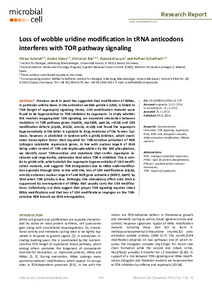| dc.date.accessioned | 2015-03-13T11:42:22Z | |
| dc.date.available | 2015-03-13T11:42:22Z | |
| dc.date.issued | 2014 | |
| dc.identifier.issn | 2311-2638 | |
| dc.identifier.uri | urn:nbn:de:hebis:34-2015031347687 | |
| dc.identifier.uri | http://hdl.handle.net/123456789/2015031347687 | |
| dc.description.sponsorship | Gefördert durch den Publikationsfonds der Universität Kassel | |
| dc.language.iso | eng | |
| dc.rights | Urheberrechtlich geschützt | |
| dc.rights.uri | https://rightsstatements.org/page/InC/1.0/ | |
| dc.subject.ddc | 570 | |
| dc.title | Loss of wobble uridine modification in tRNA anticodons interferes with TOR pathway signaling | eng |
| dc.type | Aufsatz | |
| dcterms.abstract | Previous work in yeast has suggested that modification of tRNAs, in particular uridine bases in the anticodon wobble position (U34), is linked to TOR (target of rapamycin) signaling. Hence, U34 modification mutants were found to be hypersensitive to TOR inhibition by rapamycin. To study whether this involves inappropriate TOR signaling, we examined interaction between mutations in TOR pathway genes (tip41Δ, sap190Δ, ppm1Δ, rrd1Δ) and U34 modification defects (elp3Δ, kti12Δ, urm1Δ, ncs2Δ) and found the rapamycin hypersensitivity in the latter is epistatic to drug resistance of the former. Epistasis, however, is abolished in tandem with a gln3Δ deletion, which inactivates transcription factor Gln3 required for TOR-sensitive activation of NCR (nitrogen catabolite repression) genes. In line with nuclear import of Gln3 being under control of TOR and dephosphorylation by the Sit4 phosphatase, we identify novel TOR-sensitive sit4 mutations that confer rapamycin resistance and importantly, mislocalise Gln3 when TOR is inhibited. This is similar to gln3Δ cells, which abolish the rapamycin hypersensitivity of U34 modification mutants, and suggests TOR deregulation due to tRNA undermodification operates through Gln3. In line with this, loss of U34 modifications (elp3Δ, urm1Δ) enhances nuclear import of and NCR gene activation (MEP2, GAP1) by Gln3 when TOR activity is low. Strikingly, this stimulatory effect onto Gln3 is suppressed by overexpression of tRNAs that usually carry the U34 modifications. Collectively, our data suggest that proper TOR signaling requires intact tRNA modifications and that loss of U34 modifications impinges on the TORsensitive NCR branch via Gln3 misregulation. | eng |
| dcterms.accessRights | open access | |
| dcterms.bibliographicCitation | In: Microbial cell. - Graz : Shared Science Publ., 2014, Vol. 1, 12, 416-424 | |
| dcterms.creator | Scheidt, Viktor | |
| dcterms.creator | Jüdes, André | |
| dcterms.creator | Bär, Christian | |
| dcterms.creator | Klassen, Roland | |
| dcterms.creator | Schaffrath, Raffael | |
| dc.relation.doi | doi:10.15698/mic2014.12.179 | |

